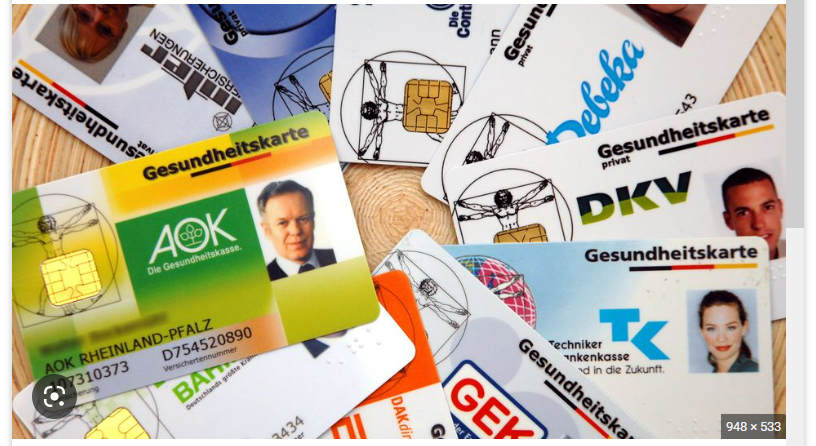Health insurance in Germany isn’t something you can skip—it’s actually mandatory! Whether you’re here as a student, a worker, or a self-employed person, you need to be insured from day one. There are two main types of health insurance:
- Public Health Insurance (Gesetzliche Krankenversicherung or GKV)
- Private Health Insurance (Private Krankenversicherung or PKV)
Most people – in fact almost 90% of Germans population are insured through the GKV, which is the public system. But some people, like high-earners, freelancers, or students over 30, may choose the PKV, which is private insurance. Let’s break down what each one offers.
2. Public vs. Private Insurance: Which One is Right for You?
Public Health Insurance (GKV):
If you’re working and earning less than €66,600 a year, you’ll be automatically enrolled in the GKV. The beauty of this system is that it’s super straightforward—your contributions are based on your income, and your employer will usually cover half the cost. What’s even better is that your family is also covered under your GKV at no extra cost. Yes, you read that right! Your spouse and kids can be insured through you. This is a big plus for families like ours, right?
Private Health Insurance (PKV):
If you’re earning above the threshold, self-employed, or just prefer more options, you can go for private insurance. With PKV, you might get more tailored plans, faster access to doctors, or private hospital rooms, but there’s a catch—you’ll pay more, and your family won’t automatically be covered like in the GKV. Each family member needs their own insurance plan. So, while private insurance might seem fancy, it can get expensive, especially for larger families.
3. What’s Covered by Health Insurance?
No matter if you’re on public or private insurance, the coverage is generally great. Here’s what you can expect:
- Doctor visits: Everything from your family doctor to specialists is covered.
- Hospital stays: Emergency care, surgeries, or overnight stays? You’re good to go.
- Prescriptions: Medications are mostly covered, but there’s usually a small co-payment.
- Preventive care: Vaccinations, check-ups, and screenings are included.
- Maternity care: Prenatal check-ups, delivery, and aftercare are all covered, which is a relief for new mothers!
Now, here’s a little pro tip: Public health insurance covers basic dental treatments, but if you need major work like braces or crowns, you might have to pay extra. Also, glasses and contacts aren’t fully covered by public plans, so check if your plan has extra options.
4. How to Sign Up for Health Insurance?
Once you’re in Germany and have a job or are studying, signing up for health insurance is easy. If you’re employed, your company will often help you with this process. But if you’re self-employed or on a student visa, here’s what to do:
- Research: Look into different public or private providers. Some popular public ones are AOK, TK, and Barmer.
- Fill out the forms: You’ll need to submit some paperwork, like your ID/passport, proof of address, and employment details.
- Get your insurance card: Once you’re enrolled, you’ll receive a little insurance card with a chip on it that you’ll show at doctor’s offices and pharmacies.
5. What About Costs?
For public insurance, you’ll pay around 14.6% of your gross salary, and don’t worry—your employer splits the cost with you. If you’re on private insurance, the costs depend on your age, health, and the type of coverage you choose. Just be sure to choose wisely because PKV plans can be more expensive, especially as you get older.
6. Why You MUST Have Insurance
In Germany, not having health insurance is a big problem. If you skip it, you might be hit with fines, and you’ll have to cover all medical costs yourself, which can get expensive very quickly. Plus, it’s illegal not to have health insurance here, so make sure you’re signed up from day one.
7. Can You Switch Insurance Providers?
Yes, it’s possible! If you’re already insured and want to switch to a new provider (maybe you found a better deal or need more coverage), you can do that. Just make sure to follow the proper steps to cancel your current plan and pay attention to any waiting periods.
8. Key Tips for Newcomers
- Emergency number: Dial 112 in case of a medical emergency—it’s free and fully covered by your insurance.
- Family coverage: If you have a family, public insurance usually covers them at no extra cost. But if you go for private insurance, each family member will need their own plan.
- Dental care: Basic dental services are covered, but if you need something more serious, check your plan for coverage.
- Extra coverage: Want more perks, like additional dental or eye care? You can add private supplements to your public insurance plan.
Conclusion:
As a fellow Pakistani living in Germany, I know how overwhelming it can be to navigate the health insurance system here. But trust me, once you understand the basics, it’s not too complicated. Whether you choose public or private insurance, the most important thing is that you and your family are covered, so you can focus on settling into your new life.
Got more questions or need help? Feel free to reach out—I’m here to help you make sense of it all!




